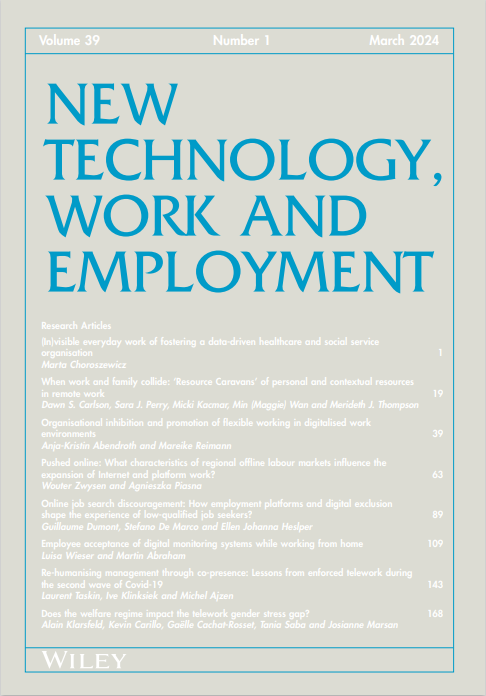无时无刻,无所不能":连通性悖论与法律职业中的性别平等
IF 7.3
3区 管理学
Q1 ERGONOMICS
引用次数: 0
摘要
数字工作场所技术在专业工作场所环境中造成了一种连接悖论。这些技术使专业人员能够在空间和时间上更好地控制自己的工作,但同时也提高了人们对工作时间以外的响应能力的期望。本研究探讨了澳大利亚律师如何理解和驾驭连接悖论,因为在科威德-19 大流行病期间和之后,数字技术迅速发展。我们发现,许多律师将数字技术带来的灵活性视为消除性别参与障碍的一种可喜的、解放性的方式,也是该行业性别平等的潜在促进因素。与此同时,工作的强度和不断保持联系的压力意味着数字在场主义可能会取代实体在场主义,强化超长工作时间的预期,并进一步侵蚀行业中的性别平等。我们的研究强调,有必要采取监管干预措施,如 "断开连接的权利",以平衡数字灵活性的好处和防止过度工作的保护措施。本文章由计算机程序翻译,如有差异,请以英文原文为准。
‘Everything now, all the time’: The connectivity paradox and gender equality in the legal profession
Digital workplace technologies have created a connectivity paradox in professional workplace settings. These technologies allow professionals greater spatial‐temporal control over their work, but also elevate expectations regarding responsiveness outside of working hours. This study examines how lawyers in Australia understand and navigate the connectivity paradox, given the rapid expansion of digital technologies during and after the Covid‐19 pandemic. We find that many lawyers experience digitally enabled flexibility as a welcome and emancipatory removal of gendered participation barriers and a potential facilitator of gender equality in the profession. At the same time, the intensity of work and pressure to be constantly connected means that digital presenteeism may be replacing physical presenteeism, reinforcing expectations of ultralong working hours and further eroding gender equality in the profession. Our study underscores the need for regulatory interventions, such as a ‘right to disconnect’, to balance the benefits of digital flexibility with protections against overwork.
求助全文
通过发布文献求助,成功后即可免费获取论文全文。
去求助
来源期刊

New Technology Work and Employment
Multiple-
CiteScore
10.50
自引率
15.50%
发文量
36
期刊介绍:
New Technology, Work and Employment presents analysis of the changing contours of technological and organisational systems and processes in order to encourage an enhanced and critical understanding of the dimensions of technological change in the workplace and in employment more generally. The journal is eclectic and invites contributions from across the social sciences, with the primary focus on critical and non-managerial approaches to the subject. It has the aim of publishing papers from perspectives concerned with the changing nature of new technology and workplace and employment relations. The objective of the journal is to promote deeper understanding through conceptual debate firmly rooted in analysis of current practices and sociotechnical change.
 求助内容:
求助内容: 应助结果提醒方式:
应助结果提醒方式:


